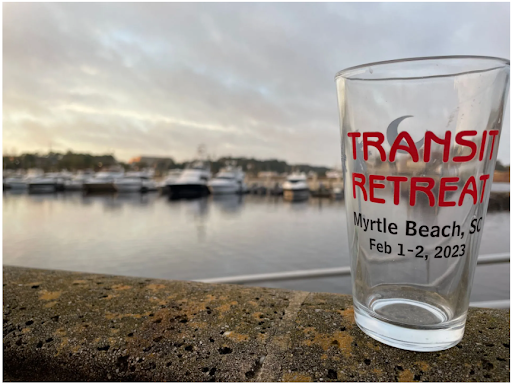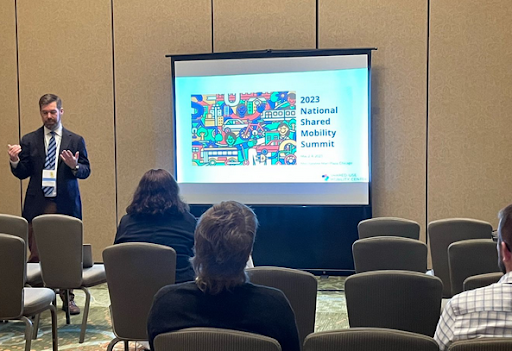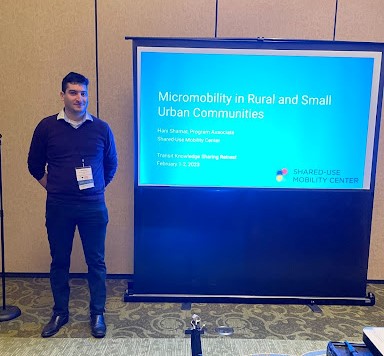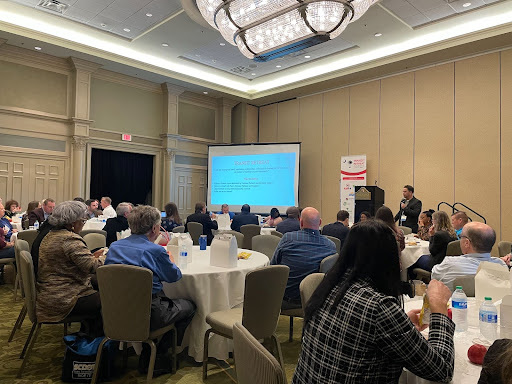Event Recap: NPMA’s Second Transit Knowledge Sharing Retreat, Myrtle Beach, SC
By Shared-Use Mobility Center
Feb 20, 2023
Revised March 2025
Introduction
Building on the First Transit Knowledge Sharing Retreat in Erie, PA in June, 2022, the Northwest Pennsylvania Mobility Alliance (NPMA), in partnership with the Transit Association of South Carolina and Coast RTA, hosted the Second Knowledge Sharing Retreat in Myrtle Beach, South Carolina on February 1-2, 2023.

Through the Shared-Use Mobility Center’s (SUMC) role as a Federal Transit Administration (FTA) sponsored Technical Assistance (TA) Center, Rudy Faust and Hani Shamat attended the Retreat representing SUMC to disseminate knowledge about mobility innovation with rural transit agencies from across the country.
The slide presentations for each of the presentations are available here.
SUMC facilitated knowledge sharing through a session showcasing the work of FTA TA centers and NPMA’s other national partners. SUMC was joined by fellow FTA’s sponsored Technical Assistance Centers National Aging and Disability Transportation Center (NADTC), the Transit Workforce Center (TWC), CALSTART, and the National Rural Transportation Assistance Program (National RTAP) to converse on the role that TA centers can have in advancing the transportation industry. TA Centers provide invaluable resources and tools to help agencies navigate through challenges in their mobility projects, and it is important to highlight the services they can provide.

SUMC presented in two additional sessions, the first on partnership and coalition building, and the second on rural micromobility. In a theme that resonated throughout the Retreat, SUMC highlighted rural projects that grantees formed across jurisdictions and funding sources. During the discussion on partnership and coalition building, Rudy Faust discussed SUMC’s work about mobility as well as some Mobility Innovation Collaborative (MIC) projects that are particularly noteworthy in their efforts to build local partnerships.
In the session on micromobility in rural and small urban contexts, Hani Shamat explored the specific challenges that small communities face when implementing bikeshare, some of the business and service models that have worked for rural bikeshare programs, and some upcoming micromobility projects for which SUMC is providing assistance.

The two-day retreat was packed with conversations on how to make rural transportation more efficient.
A Few Key Takeaways…
Partnership Building for Innovative Mobility
In addition to SUMC’s presentation on the importance of partnership building to getting innovative mobility projects off the ground, the retreat hosted many conversations on how to successfully bring agencies, private partners, and community leaders together to solve transportation problems. During a session on mobility management and coordination, Mike Spadafore, Director of Mobility Management with the Jayhawk Area Agency on Aging, presented on The Kansas Coalition for Accessible Regional Transportation (K-CART), a collaborative effort with the National Aging and Disability Transportation Center (NADTC) to bring agencies, mobility organizations, senior centers, and city partners from around the state to improve transit accessibility for all Kansans. Tim Geibel, Executive Director for the Crawford Area Transit Authority (CATA), showcased his agency’s grassroots efforts in building local support when launching the Meadville Bikeshare program.
Moving to Low and No Emission Transportation
Working to reduce the transportation industry’s carbon footprint is a momentous but necessary undertaking, and representatives from agencies and organizations working on low or no carbon transportation were present at the Retreat. Notably, Mike Hynes, National Transit Bus Program Manager at CALSTART facilitated a discussion on cost considerations for transitioning to zero emission transportation, and Steve Whaley, Director of Autogas Business Development with the Propane Education and Research Council (PERC) highlighted the climate benefits that propane can bring as an alternative fuel for fleets during a PERC-sponsored session.
Expanding Transit Beyond the Bus
A session on Expanding Transit Beyond the Bus, featuring Al Beatty from CALSTART, Julia Castillo from Heart of Iowa Regional Transit Authority (HIRTA), and Katherine Conrad, from NEORIDE, an IMI Grantee, highlighted how technology fits into innovative mobility projects. Conrad and Beatty emphasized the importance of creating a larger community of agencies for innovative mobility. This enables groups of smaller agencies to leverage capacity and procurement power to acquire cutting-edge transit technology into lower density areas. Conrad also demystified the process of creating a payments, or similar transportation, consortium. Meanwhile, Castillo highlighted technology and innovative partnerships to enable complete trips for disabled riders, including those in memory care.
Technology, Data, and Cybersecurity
A panel discussion on Cyber Security for Transit Systems and Vehicle Technologies underscored some of the risks associated with connected technology, and some of the ins and outs of a detailed incident response plan, which is shared in the slides.

Conclusion
In-person educational opportunities like the Second Transit Knowledge Sharing Retreat offer a unique forum for mobility experts from across the country to share their work and learn from each other. Both the planned sessions and informal interactions are invaluable for knowledge sharing and capacity building for agencies, mobility providers, mobility managers, researchers, and industry professionals. From the Transit Knowledge Sharing Retreat, SUMC has learned more about how smaller agencies are forming and scaling innovative partnerships, while those agencies have also learned from their peers around the country deploying new technologies.
For more information on the MIC and SUMC’s Technical Assistance and knowledge sharing work, and to stay up to date on SUMC events and emerging trends in the mobility industry, subscribe to SUMC’s Mobility Hub Newsletter